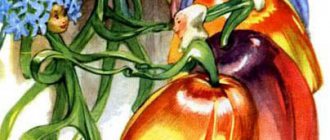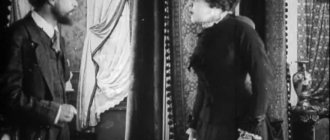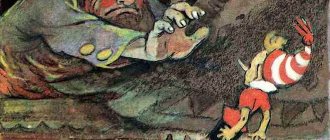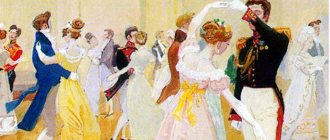Main characters of the story
Main characters:
- Nikolai Irteniev (Nikolenka) is a sixteen-year-old young man from the noble class.
- Volodya is Nikolai’s older brother.
- Dmitry Nekhlyudov is Nikolai’s close friend.
Other characters:
- Dad is Nikolai's father, a widower who later tied the knot again.
- Sonechka is Nikolenka’s first love.
- Avdotya is Nikolai's stepmother.
- Varenka Nekhlyudova is Dmitry’s sister, Nikolai’s friend.
- Lyubochka is the sister of Nikolai and Volodya.
- Ikonin, Zukhin, Semenov are students, friends of Nikolai.
Tolstoy “Youth” very brief summary
Tolstoy's youth summary for the reader's diary:
The main character of the story is 16-year-old Nikolenka Irtenev, a kind and intelligent young man from a wealthy noble family. Nikolenka lives in Moscow with her father, brother and sister. Nikolenka's mother died several years ago.
Having successfully passed the exams, Nikolenka enters the university. He begins to lead an “adult” life: he visits a restaurant for the first time, goes to an adult ball, participates in student revelries, etc. Timid and shy Nikolenka tries to seem like an adult and confident person. He is afraid to be himself, so he often plays some role in society in order to please others. It often looks awkward and stupid.
Nikolenka is friends with Dmitry Nekhlyudov, an intelligent and interesting young man. At first Nekhlyudov seems to him to be an ideal person, but over time Nikolenka becomes somewhat disappointed in his friend. Nikolenka thinks a lot about life, about herself and those around her. He lives a stormy inner life. During this period, he falls in love a lot: he likes Varenka (Nekhlyudov’s sister), Sonechka Vakhlakova (Nikolenka’s childhood love) and other young ladies. However, all these loves are not permanent.
Meanwhile, Nikolenka’s father marries a second time - to his village neighbor Avdotya Epifanova. Nikolenka does not love or respect her stepmother. Nikolenka is careless about her studies at the university, does not take notes on lectures, etc.
At the end of the course, he finds himself unprepared for the exams and, as a result, “fails.” He is not transferred to the next course. Having a hard time experiencing this shame, Nikolenka decides to start a new life and no longer waste time on nonsense.
This is interesting: The story was written in 1890. We recommend reading a summary of “The Kreutzer Sonata” by L. N. Tolstoy to familiarize yourself with the plot of the work.
Analysis of the chapter I am falling out of the story youth. L.N
Here the author abandons the external dynamic organization of the plot, that is, not a description of events is given, but experiences and impressions that arise under the influence of certain events are revealed.
Thus, the plot is built on the dynamics of inner life, and events and situations direct the course of reasoning. Psychological analysis prevails over the depiction of external events and is the basis for the development of the plot. Tolstoy uses extra-plot forms here, for example, moralistic material and his own assessment. At the center of this work is the history of the human soul. At the same time, the writer extensively uses “body language”: he describes in detail the gait, turn of the head, eyes, glance, intonation of speech, hand movements. In “Youth” Tolstoy had already basically formulated the law of moral self-improvement. This is an internal search for goodness and truth, the boundless need for love, the desire to educate one’s mind, to cultivate the will, an aversion to an idle life, a fight against pride, vanity and indifference.
The main character Nikolenka Irtenyev is a university student and is friends with Dmitry Nekhlyudov. They arrange feasts and drink burnt liquor. At first he seems to feel pleasure, but then a feeling of shame appears for his actions, for the actions of other people. They divide everyone into white bone and black bone, that is, into poor and rich. We must join the universal human flow, correct, first of all, ourselves. Nicholas once had to watch how his friend Nekhlyudov hit a servant because he did not take off his boots in time. He's ashamed of him. A pure life of love and compassion for one's neighbor is necessary.
This work constantly combines Tolstoy the artist and Tolstoy the moralist. It also describes the main character's perception of other characters. Teacher Karl Ivanovich replaced his venerable bald head with a red wig and became strange and funny. Nikolenka is surprised how he didn’t notice this before. He perceives his grandmother as an important and swaggering lady. Sonechka Valakhina, a seventeen-year-old girl for whom he had previously felt love, now sees very small and thin, with a yellow, sickly complexion, but her eyes and smile were the same that “I knew and loved in childhood.” Thus, the author shows that sometimes a person’s soul is hidden in one gesture or word, his character is guessed.
- The reader meets matured characters. Material from the site
- Nikolai goes to university.
- How the young man celebrates this event.
- Nikolai visits old acquaintances.
- The young man meets the family of his friend Nekhlyudov and Lyubov Sergeevna, with whom he falls in love.
- Nikolai's thoughts about love, about what he read in books, about his attitude towards people.
- The father remarries. They move to Moscow. Attitude of children to their stepmother.
- Nikolai attended an adult ball. He's disappointed.
- Failing university exams.
The main character of the story “Youth” is Nikolenka Irtenyev. Tolstoy portrays him as an adult, a young man who has developed certain rules, thoughts and views on life. He is smart, observant, prone to introspection, proud, shy and dreamy. The vividness of his imagination and lack of habit of hard work prevent him from demonstrating his talent. However, there is continuous and intense mental work going on inside him. Nikolenka studies at the university and is part of the student community. These years and St. Petersburg left a certain imprint on his character. He began to worship the laws of fashion, devote a lot of time and attention to his appearance, do and say things that did not correspond to his concepts. It was fashionable not to attend lectures, to be rude, to do nothing, to go to places of entertainment, to smoke a pipe and engage in useless chatter - and this is what the hero adhered to. He was absorbed in the idleness of social life. Nikolenka himself did not notice how he plunged into a rapid whirlpool of entertainment and idleness. Irtenyev began to consider himself an aristocrat, and immediately notes of contempt for people below him appeared in his manners. He stopped appreciating true feelings and respecting others. For a whole year, the hero of the story did nothing, abandoned his studies, traveled to visit guests and friends, and in the end - a shameful failure in the exams. At that moment, Nikolenka had a mental revolution. He realized1 that the made-up rules do not correspond to real life. You cannot follow the imposed opinions of the aristocratic environment, and also worship fleeting fashion, which is trying to establish its own laws and orders, throwing aside decency and honor. An idle existence is not the meaning of life that one should strive for and achieve. Failure in exams marked the beginning of a new life for the main character. He came to a very important conclusion, which he drew from his personal inner experience and from reflections on the world - to the idea of moral self-improvement. The hero of the story comes to this idea at the turning point from adolescence to youth, and from that moment life acquires meaning and deep moral content for him.
The main character of the story “Youth” is Nikolenka Irtenyev. Tolstoy portrays him as an adult, a young man who has developed certain rules, thoughts and views on life. He is smart, observant, prone to introspection, proud, shy and dreamy. The vividness of his imagination and lack of habit of hard work prevent him from demonstrating his talent. However, there is continuous and intense mental work going on inside him. Nikolenka studies at the university and is part of the student community. These years and St. Petersburg left a certain imprint on his character. He began to worship the laws of fashion, devote a lot of time and attention to his appearance, do and say things that did not correspond to his concepts. It was fashionable not to attend lectures, to be rude, to do nothing, to go to places of entertainment, to smoke a pipe and engage in useless chatter - and this is what the hero adhered to. He was absorbed in the idleness of social life. Nikolenka himself did not notice how he plunged into a rapid whirlpool of entertainment and idleness. Irtenyev began to consider himself an aristocrat, and immediately notes of contempt for people below him appeared in his manners. He stopped appreciating true feelings and respecting others. For a whole year, the hero of the story did nothing, abandoned his studies, traveled to visit guests and friends, and in the end - a shameful failure in the exams. At that moment, Nikolenka had a mental revolution. He realized1 that the made-up rules do not correspond to real life. You cannot follow the imposed opinions of the aristocratic environment, and also worship fleeting fashion, which is trying to establish its own laws and orders, throwing aside decency and honor. An idle existence is not the meaning of life that one should strive for and achieve. Failure in exams marked the beginning of a new life for the main character. He came to a very important conclusion, which he drew from his personal inner experience and from reflections on the world - to the idea of moral self-improvement. The hero of the story comes to this idea at the turning point from adolescence to youth, and from that moment life acquires meaning and deep moral content for him.
A short retelling of Tolstoy's "Youth"
Tolstoy Youth summary:
The sixteenth spring of Nikolai Irtenyev is underway. He is preparing for university exams, filled with dreams and thoughts about his future purpose. To more clearly define the purpose of life, Nikolai starts a separate notebook, where he writes down the duties and rules necessary for moral improvement. On Holy Wednesday, a gray-haired monk, a confessor, comes to the house.
After confession, Nikolai feels like a clean and new person. But at night he suddenly remembers one of his shameful sins, which he hid in confession. He hardly sleeps until the morning and at six o'clock he hurries in a cab to the monastery to confess again. Joyful, Nikolenka returns back; it seems to him that there is no better and purer person in the world than him. He cannot restrain himself and tells the cab driver about his confession. And he answers: “Well, master, your business is the master’s.” The joyful feeling disappears, and Nikolai even experiences some distrust of his wonderful inclinations and qualities.
Nikolai successfully passes the exams and is enrolled in the university. The family congratulates him. By order of his father, the coachman Kuzma, the carriage and the bay Handsome are at the complete disposal of Nikolai. Deciding that he is already quite an adult, Nikolai buys many different trinkets, a pipe and tobacco on Kuznetsky Most. At home he tries to smoke, but feels nauseous and weak. Dmitry Nekhlyudov, who came to pick him up, reproaches Nikolai, explaining the stupidity of smoking. Friends, together with Volodya and Dubkov, go to a restaurant to celebrate the younger Irtenyev’s entry into university. Observing the behavior of young people, Nikolai notices that Nekhlyudov differs from Volodya and Dubkov in a better, correct way: he does not smoke, does not play cards, does not talk about love affairs.
But Nikolai, because of his boyish enthusiasm for adult life, wants to imitate Volodya and Dubkov. He drinks champagne and lights a cigarette in a restaurant from a burning candle that stands on the table in front of strangers. As a result, a quarrel arises with a certain Kolpikov. Nikolai feels insulted, but takes out all his resentment on Dubkov, unfairly shouting at him. Realizing the childishness of his friend’s behavior, Nekhlyudov calms and consoles him.
The next day, by order of his father, Nikolenka goes, as a fully grown man, to make visits. He visits the Valakhins, Kornakovs, Ivins, Prince Ivan Ivanovich, with difficulty enduring long hours of forced conversations. Nikolai feels free and easy only in the company of Dmitry Nekhlyudov, who invites him to visit his mother in Kuntsevo. On the way, friends talk about various topics, Nikolai admits that lately he has been completely confused by the variety of new impressions. He likes Dmitry’s calm prudence without a hint of edification, his free and noble mind, he likes that Nekhlyudov forgave the shameful story in the restaurant, as if without attaching special significance to it.
Thanks to conversations with Dmitry, Nikolai begins to understand that growing up is not a simple change in time, but the slow formation of the soul. He admires his friend more and more and, falling asleep after a conversation in the Nekhlyudovs’ house, thinks about how good it would be if Dmitry married his sister or, conversely, he married Dmitry’s sister.
The next day, Nikolai leaves for the village by mail, where memories of his childhood and his mother come to life in him with renewed vigor. He thinks a lot, reflects on his future place in the world, on the concept of good manners, which requires enormous internal work on himself. Enjoying village life, Nikolai happily realizes in himself the ability to see and feel the most subtle shades of the beauty of nature.
At the age of forty-eight, my father marries for the second time. The children do not like their stepmother; after a few months, the father and his new wife develop a relationship of “quiet hatred.”
When Nikolai begins his studies at the university, it seems that he is dissolving into the mass of the same students and is in many ways disappointed with his new life. He rushes from conversations with Nekhlyudov to participation in student revelries, which are condemned by his friend. Irtenyev is irritated by the conventions of secular society, which seem for the most part to be the pretense of insignificant people. Among the students, Nikolai makes new acquaintances, and he notices that the main concern of these people is, first of all, getting pleasure from life.
Under the influence of new acquaintances, he unconsciously follows the same principle. Carelessness in studying bears fruit: Nikolai fails the first exam. For three days he does not leave the room, he feels truly unhappy and has lost all his former joy in life. Dmitry visits him, but due to the cooling that sets in their friendship, Nekhlyudov’s sympathy seems condescending and therefore offensive to Nikolai.
One late evening Nikolai takes out a notebook on which it is written: “Rules of Life.” From the surging feelings associated with youthful dreams, he cries, but not with tears of despair, but with repentance and moral impulse. He decides to write the rules of life again and never change them. The first half of youth ends in anticipation of the next, happier one.
A very short retelling
A summary of the story “Youth” by Leo Tolstoy will allow the reader to imagine the life of a sixteen-year-old student, his sorrows and joys, early dreams and hopes.
In the near future, Nikolai Irtenev has a very interesting period - admission to a higher educational institution. He is preparing for exams, and at the same time trying to come up with some rules for himself that could help him on the path of moral self-improvement.
Nikolai brilliantly passes all exams on time and is admitted to the university. The father puts at his disposal the carriage with Handsome and the coachman. To get a taste of independent adult life, Nikolenka goes on the same day to buy various unnecessary trinkets.
Together with his friends and brother, Nikolai goes to celebrate his admission to the restaurant. Watching his friends, he notes that his friend Nekhlyudov differs significantly from Volodya and Dubkov in his correct attitude towards life. However, he wants to be like him to a lesser extent.
From long conversations with Nekhlyudov, Nikolai concludes that growing up is not an easy process. This is a certain formation of thoughts, feelings, emotional experiences. He notices how difficult it is sometimes to understand new impressions that sometimes overwhelm him.
With his father’s marriage and the beginning of his studies, the main character rushes between carousing and conversations with Nekhlyudov, who does not approve of his spree. The result of a cheerful student life made itself felt - Nikolai failed some of the exams. Locked in his room, he suddenly remembered the rules of life that he had drawn up for himself before entering. He repents and rewrites all the rules, which he is now going to strictly follow.
The plot of the story “Youth” in chapters
Summary of Tolstoy's Youth:
Chapter I. What I consider the beginning of youth
The young nobleman Nikolenka Irtenyev is “in his sixteenth year.” He greatly values his friendship with Dmitry Nekhlyudov, an interesting, smart young man, thanks to whom Nikolai became interested in the idea of self-development.
Currently, the hero dreams of successfully passing the university entrance exams.
Chapter II. Spring
Spring is coming into its own, and Nikolenka admires the changes in nature that inspire him.
Chapter III. Dreams
Young Irtenyev dreams of how he will go to university and will “give part of the scholarship to the poor, and so that no one knows.” He will live a simple, modest life, and will certainly graduate "from the course as the first candidate with two gold medals."
Chapter IV. Our family circle
Nikolenka’s father is absent for a long time, but with his appearance in the house, fun always begins. Nikolai is increasingly moving away from his older brother Volodya, despite the fact that the brothers still love each other. Sister Lyubochka has become quite an adult, and is now a girl of marriageable age.
Chapter V. Rules
Nikolai decides to draw up a “schedule of duties and activities for the next year.” There were so many plans that the young man had to sew a notebook from sheets of paper and call it “Rules of Life.”
The father invites a confessor to the house so that the whole family can confess.
Chapter VI. Confession
The Irtenievs take turns visiting the monk and confessing their sins. After confession, Nikolenka feels “completely pure, morally reborn and a new person.” Before going to bed, he remembers the “shameful sin that he hid in confession” and is very worried about this. Nikolai decides to go to the monastery tomorrow and confess again.
Chapter VII. Trip to the monastery
After spending an anxious night, Nikolenka wakes up at dawn and immediately gets ready to hit the road. Having difficulty catching a cab driver on a deserted street, he worries that he will take him “to a back alley and rob him.” But soon Nikolai calms down and arrives safely at the monastery.
Chapter VIII. Second confession
Nikolai confesses again, and after his confession feels unspeakable relief. However, minor everyday troubles “soon dispersed this feeling.”
Chapter IX. How do I prepare for the exam
The entire Irtenyev family, with the exception of Nikolai and Volodya, leaves for the village. “The consciousness of freedom and that spring feeling of expectation of something” prevent Nikolenka from concentrating on preparing for the exams. And only the fear of disappointing Nekhlyudov forces the young man to study diligently.
Chapter X. History Exam
For his first exam in his life, Nikolai puts on a tailcoat. It seems to him that he is simply “dazzling,” but confidence gives way to timidity immediately after the young man steps over the threshold of the audience. Nikolenka comes across a familiar ticket, and he passes the story with an “excellent” mark.
Chapter XI. Mathematics exam
The next exam is mathematics. Nikolenka knows “the subject fairly well, but there were two questions from algebra” with which he was completely unfamiliar. The young man comes to learn from his new acquaintance, Ikonin, who gives him his ticket. As a result, Nikolenka passes the exam with flying colors.
Chapter XII. Latin exam
Nikolenka learns that the professor taking the Latin exam “was like some kind of beast who enjoyed the death of young people” whom he failed in the exams. The professor gives Irtenyev a text that was not included in the preparatory program. The young man has difficulty coping with it, and as a result receives a lower grade.
Chapter XIII. I'm big
Nikolai successfully passes the final exam and becomes a student. Now he has his own horse and coachman. In order to fully feel like an adult, Nikolenka lights a pipe and begins to “let the rings and take a drag,” but very quickly he becomes ill.
Chapter XIV. What did Volodya and Dubkov do?
Dmitry comes to congratulate Nikolai, and together they go to Dubkov, where they find Volodya playing cards. Volodya loses, and the whole company decides to go to a restaurant to congratulate Nikolenka on entering the university.
Chapter XV. They congratulate me
Everyone in the restaurant congratulates Nikolai. He really wants to seem like an adult, and he orders “half a bottle of champagne” with his own money. Volodya, looking at his drunken brother, becomes embarrassed.
Chapter XVI. Argument
At the restaurant, Nikolai has a conflict with one of the visitors, who calls him an ignoramus. The confused young man was unable to give a proper rebuff, and, ashamed of his behavior, hides this unfortunate incident from his friends. In the future, he will worry about this for a long time, believing that he “acted like a coward.”
Chapter XVII. I'm going to make visits
On the last day of his stay in Moscow, Nikolai was supposed to “make visits, by order of the pope.” He hopes that Volodya will keep him company, but his brother resolutely refuses.
Chapter XVIII. Wallachines
Nikolenka pays her first visit to Valakhin. He awaits Sonechka’s appearance with trepidation, since “he still had a living and touching memory of past childhood love.” Nikolai knows that a couple of years ago, “Sonya’s face was cut by the windows of a carriage,” which overturned while moving. However, when he sees the girl, the younger Irtenyev does not notice any scars - he sees in front of him the same sweet girl with whom he was once so in love.
Chapter XIX. Kornakovs
The visit to the Kornakovs turned out to be less pleasant for Nikolai. During a conversation with the princess and her daughters, the young man learns that the Kornakovs and Irtenyevs are the only legal heirs of the wealthy Prince Ivan Ivanovich.
Chapter XX. Iviny
At the Ivins', Nikolenka feels extremely uncomfortable. When meeting, the general’s son shows courtesy, but at the same time makes it clear that he is not at all happy about Nikolenka’s arrival. As a result, Irtenyev begins to “get into an irritated state of mind.” The princess puts Nikolenka in an awkward position with her unexpected tears, and the prince behaves coldly and arrogantly towards him.
Chapter XXI. Prince Ivan Ivanovich
Nicholas pays his last visit to the prince. As a child, he called “Ivan Ivanovich grandfather,” but the news that he is one of his heirs makes Nikolenka feel uncomfortable in the company of the benevolent old man.
Chapter XXII. An intimate conversation with my friend
Nikolenka goes with Dmitry to the Nekhlyudovs’ dacha. On the way, the friends have a heart-to-heart talk, and Dmitry confesses his love for his hanger-on Lyubov Sergeevna.
Chapter XXIII. Nekhlyudovs
At the dacha, Nikolenka meets Dmitry’s mother and sister. He wonders how his friend could fall in love with the old maid Lyubov Sergeevna, who “was very ugly: red-haired, thin, short in stature, a little lopsided.”
Chapter XXIV. Love
Also at the Nekhlyudovs, Nikolai meets Dmitry’s own aunt Sofya Ivanovna, an amazingly kind and loving woman.
Chapter XXV. I'm getting acquainted
Nikolenka notes that in the Nekhlyudov family a sore subject is Dmitry’s feeling for the hanger-on. Irtenyev is very pleased with the trip - among these people he feels completely grown up.
Chapter XXVI. I show myself at my best
While walking through the garden, Nikolenka, wanting to impress, boasts of her relationship with Ivan Ivanovich. He embellishes his relationship with the prince, which makes him embarrassed and blush.
Chapter XXVII. Dmitriy
A severe toothache changes Dmitry's mood for the worse. At first he took it out on the maid, and then “with all his might he punched” the servant boy in the head several times. Noticing that Nikolai witnessed his cruelty, Dmitry felt ashamed.
Chapter XXVIII. In the village
Nikolenka and Volodya join their family in the village. Nikolai periodically remembers his love for Sonya, but soon village life captivates him. He notices that his father seems unusually cheerful lately.
Chapter XXIX. Relationships between us and the girls
Nikolenka “completely involuntarily looks at girls” imitates her older brother, and treats her sister and Katya somewhat contemptuously. Meanwhile, the brothers become even closer to each other.
Chapter XXX. My classes
Convinced that she has “talent and passion for music,” Nikolenka spends the entire summer taking piano lessons. This is how he wants to charm young ladies. Nikolai also enjoys reading French novels.
Chapter XXXI. Comme il faut
Wanting to imitate the heroes of novels, Nikolenka always strives to look perfect. He places special emphasis on the condition of his nails.
Chapter XXXII. Youth
This summer, Nikolenka acutely feels that he is “young, innocent, free and therefore almost happy.” He enjoys the summer, admires nature and does what his soul is drawn to.
Chapter XXXIII. Neighbours
Nikolenka notices with surprise that her father has changed in his attitude towards his neighbors Epifanov, with whom he had a long-standing “litigation for some land.” My father often visits his neighbors and calls them “nice people.”
Chapter XXXIV. Father's marriage
For the second time, Nikolai’s father is going to marry at the age of 48. Avdotya Vasilyevna Epifanova, a young and beautiful woman, becomes his chosen one.
Chapter XXXV. How did we receive this news?
The father's marriage becomes the main subject of discussion in the Irtenyev family. Volodya is extremely negative towards his future stepmother, and admits that the reason for the marriage is a certain “dark story”.
Chapter XXXVI. University
Classes begin at the university, and Volodya and Nikolai are forced to miss the wedding of their father and Avdotya. At the university, Nikolenka cannot quickly and easily join “any company and, feeling lonely and incapable of getting closer,” begins to behave arrogantly with his classmates.
Chapter XXXVII. Matters of the heart
Nikolenka often falls in love “with strangers and especially married women.” However, all his heartfelt interests are very fleeting.
Chapter XXXVIII. Light
“Secular pleasures” disappoint Nikolenka. Finding himself at the long-awaited reception with the Kornakovs, the young man becomes timid and begins to behave extremely unnaturally and talk all sorts of nonsense. He looks so stupid that even Volodya avoids him.
Chapter XXXIX. Revelry
In winter, Nikolai happens to take part in a revelry, and he gets out of it “not a very pleasant feeling.” He had been preparing for the upcoming event for a long time, but in reality it turned out to be not as fun as young Irtenyev expected. He is incredibly surprised that the next day the participants in the revelry praised him in every possible way.
Chapter XL. Friendship with the Nekhlyudovs
Nikolai becomes a frequent guest in the Nekhlyudovs’ house. He likes to be in this family, and soon he becomes close to Dmitry’s sister, Varya.
Chapter XLI. Friendship with Nekhlyudov
And if Nikolai’s friendship with the Nekhlyudovs is strengthening, then relations with Dmitry himself at that time hung “only by a thread.” Nikolenka ceases to understand the actions of his friend, he finds many shortcomings in him, and one day a quarrel breaks out between the friends.
Chapter XLII. Stepmother
His father and stepmother come to Moscow, whom Nikolenka does not like or respect. Avdotya’s duplicity especially irritates him: when guests are present, she is invariably “a young, healthy and cold beauty,” but in ordinary life she is “a melancholy woman, sloppy and bored.”
Chapter XLIII. New comrades
Nikolai is preparing for the upcoming exams. She meets poor, but extremely smart and interesting students who are superior to him in everything except belonging to the aristocracy.
Chapter XLIV. Zukhin and Semenov
Among Nikolenka’s acquaintances, two students especially stand out: Semenov and Zukhin. The latter “was extraordinarily intelligent” and was highly respected among teachers, while Semenov was a passionate carouser. As a result, he became terribly in debt and was forced to quit university and become a soldier.
Chapter XLV. I'm falling through
Nikolenka fails his math exam miserably and is not promoted to the next course. Locked in his room, he cries bitterly for three days, regretting that he did not adhere to his own “Rules of Life.” Nikolai vows “not to do anything bad,” to work and not to betray his own principles.
Conclusion
In his story, Tolstoy surprisingly subtly describes the psychology of growing up of the main character, who is entering “adult” life. He masterfully describes the experiences, doubts and hopes of a young man who was just a boy yesterday.





